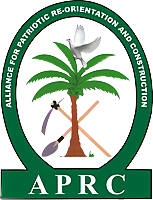Alliance for Patriotic Reorientation and Construction
Alliance for Patriotic Reorientation and Construction | |
|---|---|
 | |
| Leader | Fabakary Jatta |
| Founder | Yahya Jammeh |
| Founded | 1996 |
| Headquarters | Banjul |
| Ideology | Religious conservatism Social conservatism Right-wing populism Anti-colonialism |
| Political position | Right-wing |
| Religion | Sunni Islam |
| Colors | Green |
| National Assembly | 3 / 58
|
| Pan African Parliament | 4 / 5
|
The Alliance for Patriotic Reorientation and Construction (APRC) is a political party in The Gambia. Founded by army officers who staged the 1994 coup, it was the ruling party from 1996 to 2016 under President Yahya Jammeh.[1]
History
[edit]The APRC was formed in 1996 to support coup organiser Yahya Jammeh's successful campaign in the 1996 presidential election. The party ruled over the next twenty years, winning a series of controversial elections. For instance, no other candidates ran in 33 of the 45 National Assembly seats won by the APRC in the 2002 parliamentary elections, as the main opposition boycotted what it described would be an unfair vote.[2]
Despite such criticisms, the APRC was described as very popular amongst the Jola ethnic group. In terms of nationwide percentage, the party's best parliamentary election result was in 2007 (59.7%), while the best presidential election result came in 2011 (71.5%).[3]
Jammeh was ultimately denied a fifth term in the 2016 presidential election by activist Adama Barrow, and the APRC lost a whopping 38 seats in the following year's parliamentary vote, going into opposition for the first time.[4]
New leader Fabakary Jatta has sought to distance the party from the alleged crimes committed by Jammeh during his twenty year rule, and endorsed Barrow's successful re-election campaign in 2021. Jammeh criticised the decision. After the 2022 parliamentary election resulted in a hung parliament for the first time in the country's history, the APRC formed a coalition agreement with Barrow's National People's Party. This caused internal turmoil, as many members, including within the party establishment, remain loyal to Jammeh.[5]
Electoral history
[edit]Presidential elections
[edit]| Election | Candidate | Votes | % | Results |
|---|---|---|---|---|
| 1996 | Yahya Jammeh | 220,011 | 55.8% | Elected |
| 2001 | 242,302 | 52.8% | Elected | |
| 2006 | 264,404 | 67.3% | Elected | |
| 2011 | 470,550 | 71.5% | Elected | |
| 2016 | 208,487 | 39.6% | Lost |
National Assembly elections
[edit]| Election | Party leader | Votes | % | Seats | +/– | Position | Government |
|---|---|---|---|---|---|---|---|
| 1997 | Yahya Jammeh | 160,470 | 52.13% | 33 / 49
|
New | Supermajority | |
| 2002 | 29,097 | 51.05% | 45 / 53
|
Supermajority | |||
| 2007 | 157,392 | 59.70% | 42 / 53
|
Supermajority | |||
| 2012 | 80,289 | 51.82% | 43 / 53
|
Supermajority | |||
| 2017 | Fabakary Jatta | 60,331 | 15.91% | 5 / 53
|
Opposition | ||
| 2022 | 15,710 | 3.19% | 2 / 53
|
Coalition (NPP-NRP-APRC) |
References
[edit]- ^ "Gambia opposition unite to fight". BBC News. 18 January 2005.
- ^ Barry Turner (7 February 2017). The Statesman's Yearbook 2005: The Politics, Cultures and Economies of the World. Springer. ISBN 9780230271333.
- ^ Elections in The Gambia African Elections Database
- ^ "The Total of Final Election Results". Independent Electoral Commission of The Gambia. 5 December 2016. Archived from the original on 7 December 2016. Retrieved 23 January 2017.
- ^ Hultin, Niklas. "What Barrow's re-election means for The Gambia". The Conversation. Retrieved 12 December 2021.
